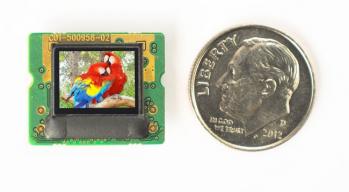eMagin reports its financial results for Q1 2017
OLED microdisplay maker eMagin reported its financial results for Q1 2017. Revenues in the quarter were $6.1 million (down from $7 million in Q1 2016). Product revenues totaled $4.4 million (down from $5.3 million in Q1 2016 but up from $3.7 million in Q4 2016). Net loss was $2 million (compared to a net income of $11,000 in Q1 2016).

At the end of the quarter eMagin had $3.8 million in cash and equivalents. The company's main objectives in the near future is to advance its technology and complete the direct-patterning development, achieve consumer design wins for VR and AR headset makers and sign a large-scale production agreement to support the large volumes required for consumer displays.
eMagin to help the US Army to retrofit high brightness OLED microdisplays in helicopter helmets
OLED microdisplay maker eMagin announced that the US Army will use its new high-brightness OLED microdisplays in its major helicopter helmet upgrade program. The program will retrofit high brightness, monochrome green microdisplays into the current fielded helmet. This new project also includes funding for engineering of production tooling as eMagin will be responsible for a higher-level display, taper, and lens assembly.

eMagin expects full production to commence in 2018 (following ground and flight testing) and continue for several years to complete retrofits for over 1000 airframes.
eMagin reports its financial results for Q4 2016
OLED microdisplay maker eMagin reported its financial results for Q4 2016. Revenues in the fourth quarter were $4.6 million, down 33% from Q4 2015 - mostly because of a decline in sales to maturing US military programs. Net loss for the quarter was $3.5 million (up from $2.1 million in Q4 2015). For the whole year of 2016 revenues were $21.4 million.

eMagin also announced that it signed a multi-million dollar agreement with "another" Tier-1 consumer electronics company - "an easily recognizable one". This is the third such agreement in the past 15 months. eMagin says that the commercial sector will become more important and will start generating revenues in Q1 2017. eMagin is in active discussions with partners to enable the high volume production capabilities required by the commercial market demand. eMagin started producing samples of its 2k x 2k displays and these should enter mass production in Q2 2017.
A brief overview of the OLED Microdisplay market
The OLED display market is now an established market with over $10 billion in annual revenue. OLEDs are mostly used in mobile devices - over 300 million AMOLED panels were produced in 2016, most of them used in smartphones. OLED panels are also used in TVs, tablets, smartwatches, laptops and VR headsets.

Back in 2001, eMagin started offering OLED microdisplays, which are tiny displays fabricated directly on the silicon control circuitry (on the CMOS). Since 2001, the OLED microdisplay market is growing slowly and these high-end microdisplays are mostly used in defense, medical and industrial applications due to their high cost. Many high-end digital cameras also use OLED microdisplays for their electronic viewfinder (EVF).
eMagin starts to ship 2K x 2K OLED microdisplays
OLED microdisplay maker eMagin announced that the company started to ship 2k x 2k OLED microdisplays "as part of an agreement with a Tier-One company". This could be the announced first licensee for eMagin's HMD design or this could be a different company. eMagin also announced today that it signed a second partner (or customer?) and expects to sign more such agreements in 2017.

It's not clear whether eMagin is shipping samples or actual volume microdisplays, and whether this Tier-One company is a partner or a customer. We know that AMD is working with eMagin (but I believe that AMD aims to become a foundry for eMagin if/when it needs higher volume). A potential customer is ODG, but ODG is not using eMagin's 2k x 2k OLEDs but rather lower-resolution ones.
eMagin announces a $5 million credit facility
OLED Microdisplay maker eMagin announced that it has entered into a $5 million revolving credit working capital facility. The financing will be used for general corporate purposes including funding the inventory build for the company’s recently launched consumer products, BlazeSpark and BlazeTorch. The facility has a term of three years.
Last month eMagin reported its financial results for Q3 0216, with revenues of $4.3 million and a net loss of $2.4 million. At the end of September 2016 eMagin had about $6.9 million in cash, so it obviously needs the new credit line.
ODG raises $58 million, but what kind of OLED will it use in its Horizon consumer AR glasses?
San Francisco based Osterhout Design Group (ODG) announced that it raised $58 million from several investors, including Shenzhen O-film Tech and Vanfund Urban Investment & Development. This is ODG's round A investment, but it is not a new company - it has been active with enterprise AR solutions for eight years, and in 2014 it sold some of its IP to Microsoft for $150 million.
 ODG R-7
ODG R-7
Why does ODG need so much money? Because it is entering the consumer market with its upcoming codename-Horizon platform, which will be an AR/VR platform that is based on OLED microdisplays. The Horizon platform will support a wide FOV, 120 fps and support for 4K 3D content.
eMagin reports financial results for Q3 2016, launches two consumer night-vision products
eMagin reported the company's financial results for Q3 0216. Revenues were $4.3 million, down 20% from Q3 2015, operating loss was $3.8 million (up from $3.3 million in Q3 2015) - and net loss was $2.4 million (up from $2.2 million in Q3 2015). As of the end of September the company had about $6.9 million in cash and equivalents (down from $9.3 million in the end of 2015).
These are disappointing results, but eMagin says it is making considerable strategic business progress. On the technical side, eMagin is developing direct-patterning micro OLEDs, and expect to complete its development work under the Man Tech program in 2017. Military customers will be offered displays in the second half of 2017. The 2K x 2K full-color OLED microdisplay is also progressing is on schedule to produce engineering samples. Samples will be shipped to customers in the beginning of December.
Karl Guttag: Magic Leap's AR display is most likely an OLED microdisplay
Microdisplay-expert (and personal friend) Karl Guttag posted an interesting article in which he delves deep into Magic Leap's patent filing and demonstrations to try and understand the technology used by the stealth AR startup that raised over $2 billion from Google and other companies.

While it seems that Magic Leap is developing several different technologies and perhaps even several devices based on different displays, Karl's conclusion is that an OLED Microdisplay is the most likely candidate for Magic Leap's demonstration unit (which may be different from the actual future commercial version).
AMD stresses the need for high-resolution VR displays, is working with eMagin for 18 months
OLED microdisplay maker eMagin developed a 2K x 2K OLED microdisplay based VR HMD, which is now being offered to partners (the company's first licensee is probably ODG). The company is also developing its next-gen 4K OLED microdisplays.
eMagin needs to find a high-volume production partner if it wants to enter the consumer market (eMagin announced production expansion will not be enough) and eMagin already stated that it is in talks with potential foundry partners. One of these partners is AMD - which we already know is working with eMagin.
Pagination
- Previous page
- Page 7
- Next page





